Research Project Report: Analysis of Research Approaches and Methods
VerifiedAdded on 2020/12/31
|13
|4044
|112
Report
AI Summary
This research project report delves into the core concepts of research, examining research philosophy, approaches, and methods within a business and management context. The report begins with an introduction to research philosophy, outlining the advantages and characteristics of various philosophies such as positivism, interpretivism, realism, and pragmatism. It then explores different research approaches, including deductive, abductive, and inductive methods, providing detailed explanations and examples. The analysis further extends to evaluating philosophical stances and approaches across three different papers, highlighting the application of various methodologies. The second part of the report focuses on research methods, including research design and methodological choices between qualitative and quantitative methods. It also presents the characteristics of qualitative and quantitative research to demonstrate the relevance of each method. This report provides a comprehensive overview of research methodologies, making it a valuable resource for students studying business and management.

Research Project
Paraphrase This Document
Need a fresh take? Get an instant paraphrase of this document with our AI Paraphraser
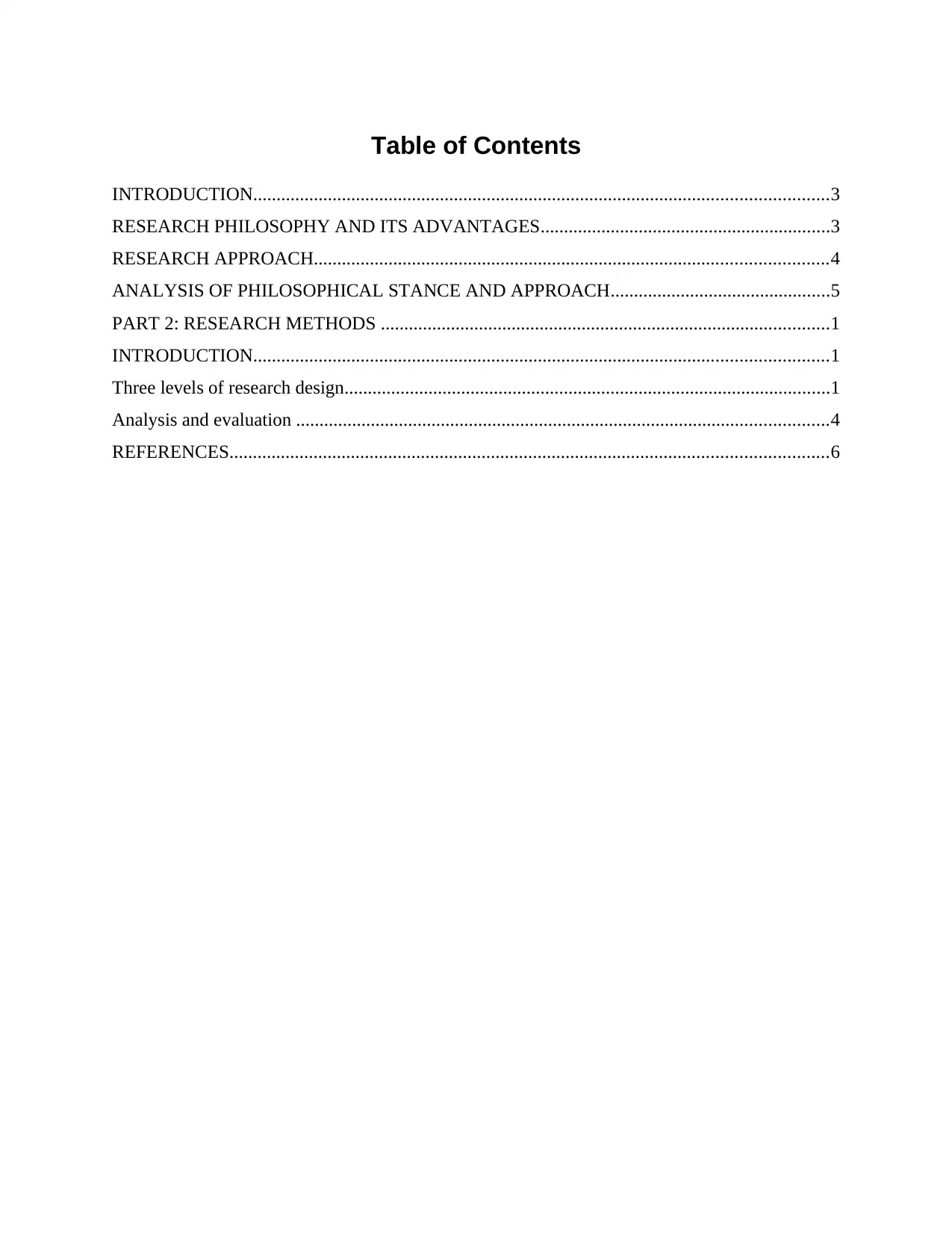
Table of Contents
INTRODUCTION...........................................................................................................................3
RESEARCH PHILOSOPHY AND ITS ADVANTAGES..............................................................3
RESEARCH APPROACH..............................................................................................................4
ANALYSIS OF PHILOSOPHICAL STANCE AND APPROACH...............................................5
PART 2: RESEARCH METHODS ................................................................................................1
INTRODUCTION...........................................................................................................................1
Three levels of research design........................................................................................................1
Analysis and evaluation ..................................................................................................................4
REFERENCES................................................................................................................................6
INTRODUCTION...........................................................................................................................3
RESEARCH PHILOSOPHY AND ITS ADVANTAGES..............................................................3
RESEARCH APPROACH..............................................................................................................4
ANALYSIS OF PHILOSOPHICAL STANCE AND APPROACH...............................................5
PART 2: RESEARCH METHODS ................................................................................................1
INTRODUCTION...........................................................................................................................1
Three levels of research design........................................................................................................1
Analysis and evaluation ..................................................................................................................4
REFERENCES................................................................................................................................6
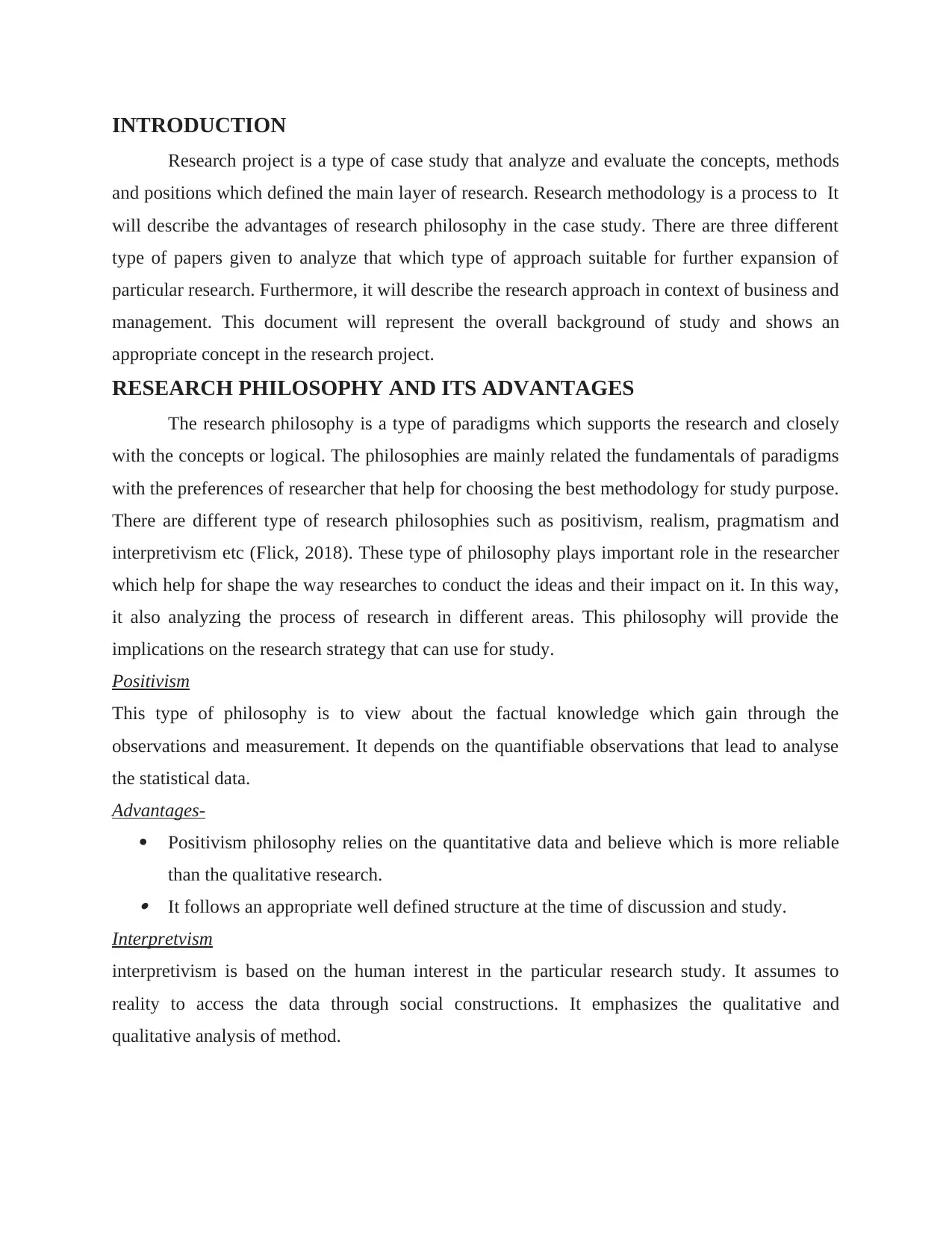
INTRODUCTION
Research project is a type of case study that analyze and evaluate the concepts, methods
and positions which defined the main layer of research. Research methodology is a process to It
will describe the advantages of research philosophy in the case study. There are three different
type of papers given to analyze that which type of approach suitable for further expansion of
particular research. Furthermore, it will describe the research approach in context of business and
management. This document will represent the overall background of study and shows an
appropriate concept in the research project.
RESEARCH PHILOSOPHY AND ITS ADVANTAGES
The research philosophy is a type of paradigms which supports the research and closely
with the concepts or logical. The philosophies are mainly related the fundamentals of paradigms
with the preferences of researcher that help for choosing the best methodology for study purpose.
There are different type of research philosophies such as positivism, realism, pragmatism and
interpretivism etc (Flick, 2018). These type of philosophy plays important role in the researcher
which help for shape the way researches to conduct the ideas and their impact on it. In this way,
it also analyzing the process of research in different areas. This philosophy will provide the
implications on the research strategy that can use for study.
Positivism
This type of philosophy is to view about the factual knowledge which gain through the
observations and measurement. It depends on the quantifiable observations that lead to analyse
the statistical data.
Advantages-
Positivism philosophy relies on the quantitative data and believe which is more reliable
than the qualitative research. It follows an appropriate well defined structure at the time of discussion and study.
Interpretvism
interpretivism is based on the human interest in the particular research study. It assumes to
reality to access the data through social constructions. It emphasizes the qualitative and
qualitative analysis of method.
Research project is a type of case study that analyze and evaluate the concepts, methods
and positions which defined the main layer of research. Research methodology is a process to It
will describe the advantages of research philosophy in the case study. There are three different
type of papers given to analyze that which type of approach suitable for further expansion of
particular research. Furthermore, it will describe the research approach in context of business and
management. This document will represent the overall background of study and shows an
appropriate concept in the research project.
RESEARCH PHILOSOPHY AND ITS ADVANTAGES
The research philosophy is a type of paradigms which supports the research and closely
with the concepts or logical. The philosophies are mainly related the fundamentals of paradigms
with the preferences of researcher that help for choosing the best methodology for study purpose.
There are different type of research philosophies such as positivism, realism, pragmatism and
interpretivism etc (Flick, 2018). These type of philosophy plays important role in the researcher
which help for shape the way researches to conduct the ideas and their impact on it. In this way,
it also analyzing the process of research in different areas. This philosophy will provide the
implications on the research strategy that can use for study.
Positivism
This type of philosophy is to view about the factual knowledge which gain through the
observations and measurement. It depends on the quantifiable observations that lead to analyse
the statistical data.
Advantages-
Positivism philosophy relies on the quantitative data and believe which is more reliable
than the qualitative research. It follows an appropriate well defined structure at the time of discussion and study.
Interpretvism
interpretivism is based on the human interest in the particular research study. It assumes to
reality to access the data through social constructions. It emphasizes the qualitative and
qualitative analysis of method.
⊘ This is a preview!⊘
Do you want full access?
Subscribe today to unlock all pages.

Trusted by 1+ million students worldwide
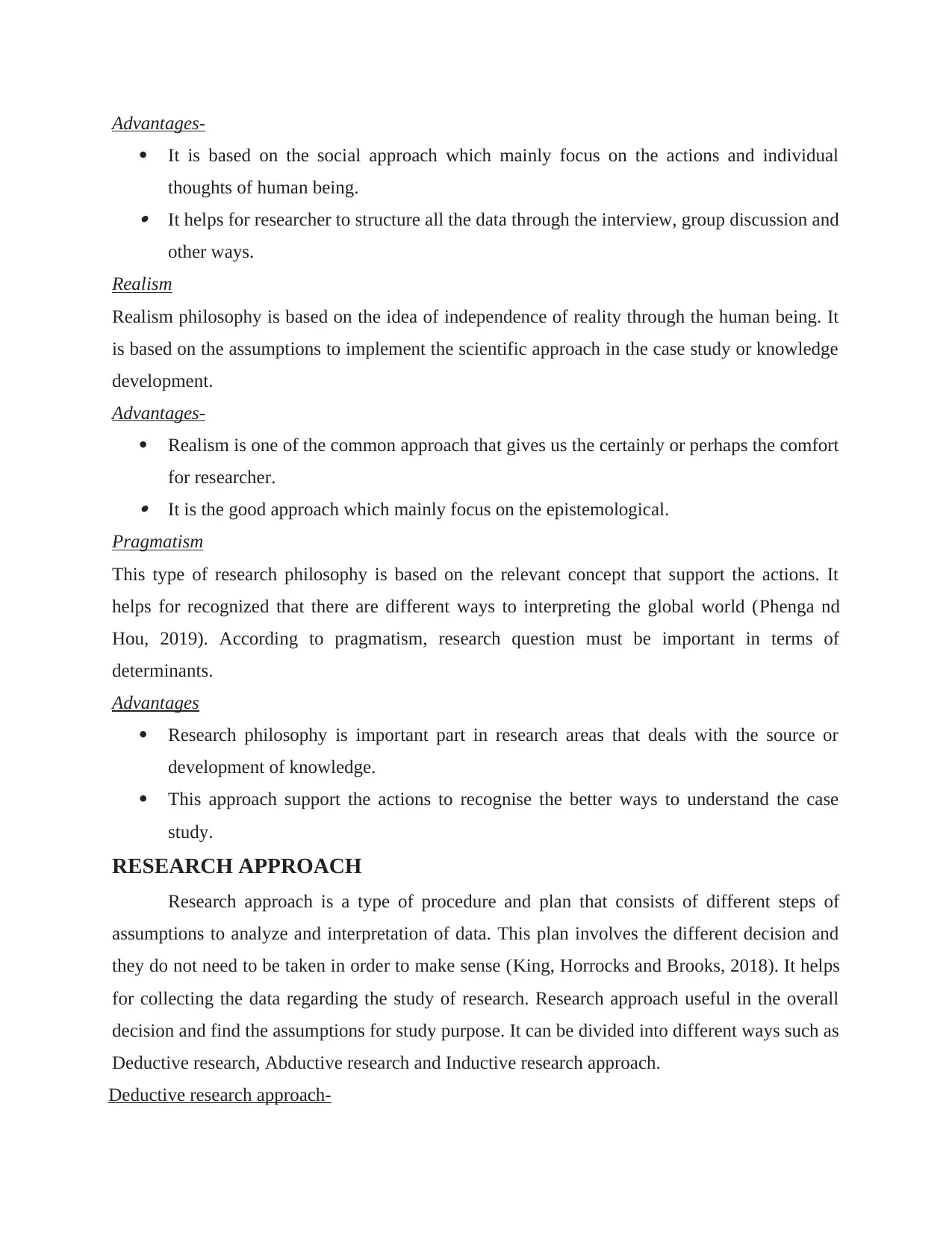
Advantages-
It is based on the social approach which mainly focus on the actions and individual
thoughts of human being. It helps for researcher to structure all the data through the interview, group discussion and
other ways.
Realism
Realism philosophy is based on the idea of independence of reality through the human being. It
is based on the assumptions to implement the scientific approach in the case study or knowledge
development.
Advantages-
Realism is one of the common approach that gives us the certainly or perhaps the comfort
for researcher. It is the good approach which mainly focus on the epistemological.
Pragmatism
This type of research philosophy is based on the relevant concept that support the actions. It
helps for recognized that there are different ways to interpreting the global world (Phenga nd
Hou, 2019). According to pragmatism, research question must be important in terms of
determinants.
Advantages
Research philosophy is important part in research areas that deals with the source or
development of knowledge.
This approach support the actions to recognise the better ways to understand the case
study.
RESEARCH APPROACH
Research approach is a type of procedure and plan that consists of different steps of
assumptions to analyze and interpretation of data. This plan involves the different decision and
they do not need to be taken in order to make sense (King, Horrocks and Brooks, 2018). It helps
for collecting the data regarding the study of research. Research approach useful in the overall
decision and find the assumptions for study purpose. It can be divided into different ways such as
Deductive research, Abductive research and Inductive research approach.
Deductive research approach-
It is based on the social approach which mainly focus on the actions and individual
thoughts of human being. It helps for researcher to structure all the data through the interview, group discussion and
other ways.
Realism
Realism philosophy is based on the idea of independence of reality through the human being. It
is based on the assumptions to implement the scientific approach in the case study or knowledge
development.
Advantages-
Realism is one of the common approach that gives us the certainly or perhaps the comfort
for researcher. It is the good approach which mainly focus on the epistemological.
Pragmatism
This type of research philosophy is based on the relevant concept that support the actions. It
helps for recognized that there are different ways to interpreting the global world (Phenga nd
Hou, 2019). According to pragmatism, research question must be important in terms of
determinants.
Advantages
Research philosophy is important part in research areas that deals with the source or
development of knowledge.
This approach support the actions to recognise the better ways to understand the case
study.
RESEARCH APPROACH
Research approach is a type of procedure and plan that consists of different steps of
assumptions to analyze and interpretation of data. This plan involves the different decision and
they do not need to be taken in order to make sense (King, Horrocks and Brooks, 2018). It helps
for collecting the data regarding the study of research. Research approach useful in the overall
decision and find the assumptions for study purpose. It can be divided into different ways such as
Deductive research, Abductive research and Inductive research approach.
Deductive research approach-
Paraphrase This Document
Need a fresh take? Get an instant paraphrase of this document with our AI Paraphraser
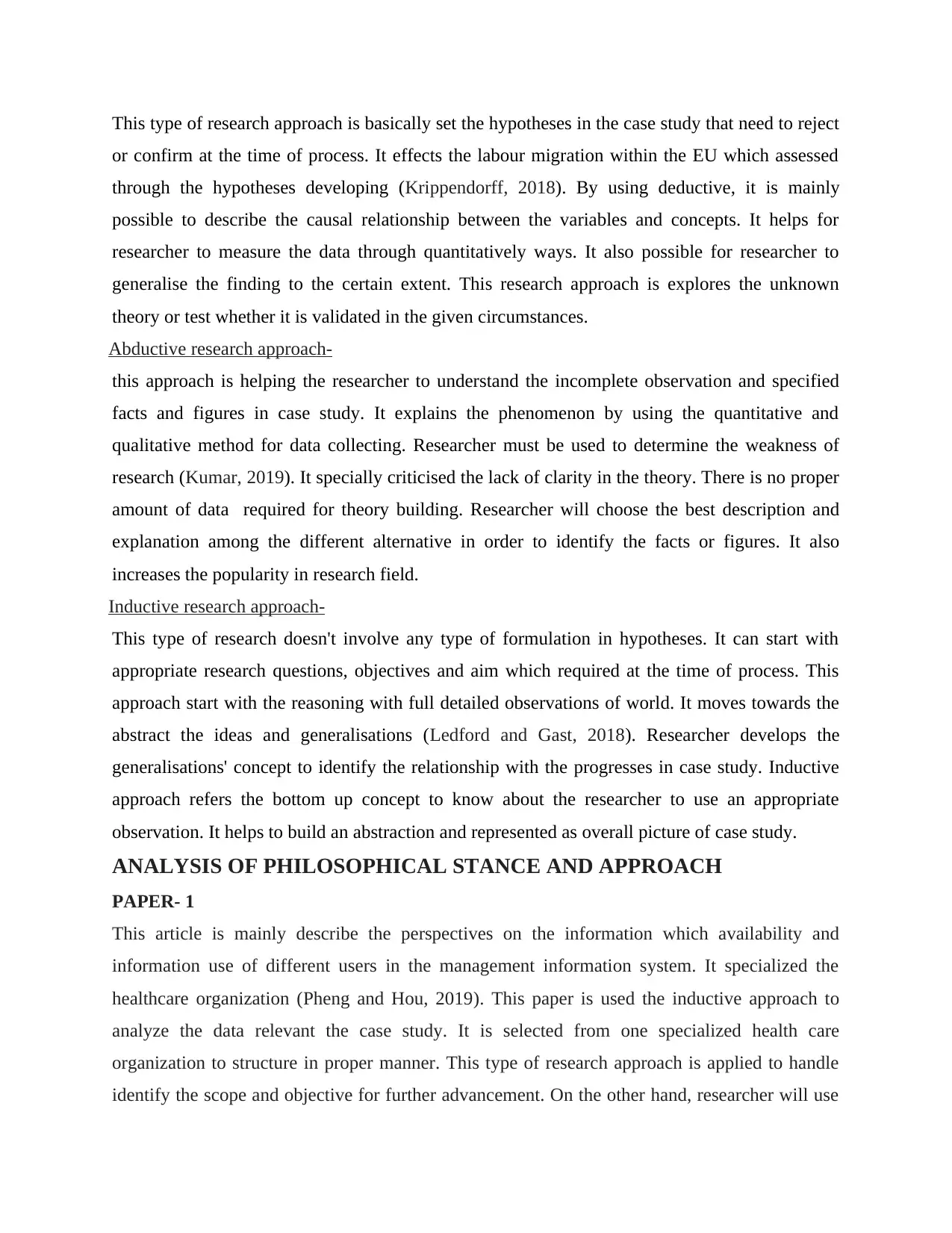
This type of research approach is basically set the hypotheses in the case study that need to reject
or confirm at the time of process. It effects the labour migration within the EU which assessed
through the hypotheses developing (Krippendorff, 2018). By using deductive, it is mainly
possible to describe the causal relationship between the variables and concepts. It helps for
researcher to measure the data through quantitatively ways. It also possible for researcher to
generalise the finding to the certain extent. This research approach is explores the unknown
theory or test whether it is validated in the given circumstances.
Abductive research approach-
this approach is helping the researcher to understand the incomplete observation and specified
facts and figures in case study. It explains the phenomenon by using the quantitative and
qualitative method for data collecting. Researcher must be used to determine the weakness of
research (Kumar, 2019). It specially criticised the lack of clarity in the theory. There is no proper
amount of data required for theory building. Researcher will choose the best description and
explanation among the different alternative in order to identify the facts or figures. It also
increases the popularity in research field.
Inductive research approach-
This type of research doesn't involve any type of formulation in hypotheses. It can start with
appropriate research questions, objectives and aim which required at the time of process. This
approach start with the reasoning with full detailed observations of world. It moves towards the
abstract the ideas and generalisations (Ledford and Gast, 2018). Researcher develops the
generalisations' concept to identify the relationship with the progresses in case study. Inductive
approach refers the bottom up concept to know about the researcher to use an appropriate
observation. It helps to build an abstraction and represented as overall picture of case study.
ANALYSIS OF PHILOSOPHICAL STANCE AND APPROACH
PAPER- 1
This article is mainly describe the perspectives on the information which availability and
information use of different users in the management information system. It specialized the
healthcare organization (Pheng and Hou, 2019). This paper is used the inductive approach to
analyze the data relevant the case study. It is selected from one specialized health care
organization to structure in proper manner. This type of research approach is applied to handle
identify the scope and objective for further advancement. On the other hand, researcher will use
or confirm at the time of process. It effects the labour migration within the EU which assessed
through the hypotheses developing (Krippendorff, 2018). By using deductive, it is mainly
possible to describe the causal relationship between the variables and concepts. It helps for
researcher to measure the data through quantitatively ways. It also possible for researcher to
generalise the finding to the certain extent. This research approach is explores the unknown
theory or test whether it is validated in the given circumstances.
Abductive research approach-
this approach is helping the researcher to understand the incomplete observation and specified
facts and figures in case study. It explains the phenomenon by using the quantitative and
qualitative method for data collecting. Researcher must be used to determine the weakness of
research (Kumar, 2019). It specially criticised the lack of clarity in the theory. There is no proper
amount of data required for theory building. Researcher will choose the best description and
explanation among the different alternative in order to identify the facts or figures. It also
increases the popularity in research field.
Inductive research approach-
This type of research doesn't involve any type of formulation in hypotheses. It can start with
appropriate research questions, objectives and aim which required at the time of process. This
approach start with the reasoning with full detailed observations of world. It moves towards the
abstract the ideas and generalisations (Ledford and Gast, 2018). Researcher develops the
generalisations' concept to identify the relationship with the progresses in case study. Inductive
approach refers the bottom up concept to know about the researcher to use an appropriate
observation. It helps to build an abstraction and represented as overall picture of case study.
ANALYSIS OF PHILOSOPHICAL STANCE AND APPROACH
PAPER- 1
This article is mainly describe the perspectives on the information which availability and
information use of different users in the management information system. It specialized the
healthcare organization (Pheng and Hou, 2019). This paper is used the inductive approach to
analyze the data relevant the case study. It is selected from one specialized health care
organization to structure in proper manner. This type of research approach is applied to handle
identify the scope and objective for further advancement. On the other hand, researcher will use
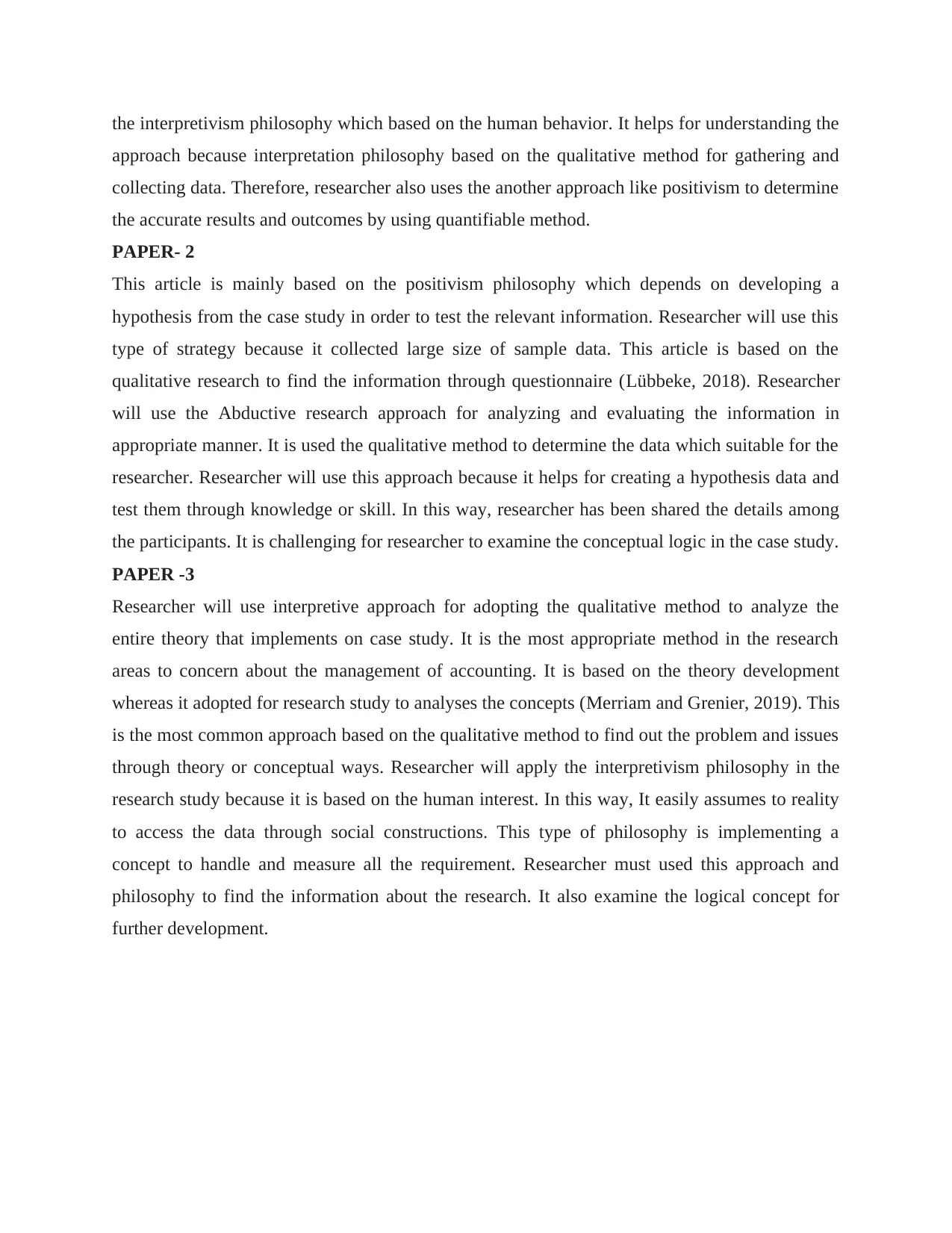
the interpretivism philosophy which based on the human behavior. It helps for understanding the
approach because interpretation philosophy based on the qualitative method for gathering and
collecting data. Therefore, researcher also uses the another approach like positivism to determine
the accurate results and outcomes by using quantifiable method.
PAPER- 2
This article is mainly based on the positivism philosophy which depends on developing a
hypothesis from the case study in order to test the relevant information. Researcher will use this
type of strategy because it collected large size of sample data. This article is based on the
qualitative research to find the information through questionnaire (Lübbeke, 2018). Researcher
will use the Abductive research approach for analyzing and evaluating the information in
appropriate manner. It is used the qualitative method to determine the data which suitable for the
researcher. Researcher will use this approach because it helps for creating a hypothesis data and
test them through knowledge or skill. In this way, researcher has been shared the details among
the participants. It is challenging for researcher to examine the conceptual logic in the case study.
PAPER -3
Researcher will use interpretive approach for adopting the qualitative method to analyze the
entire theory that implements on case study. It is the most appropriate method in the research
areas to concern about the management of accounting. It is based on the theory development
whereas it adopted for research study to analyses the concepts (Merriam and Grenier, 2019). This
is the most common approach based on the qualitative method to find out the problem and issues
through theory or conceptual ways. Researcher will apply the interpretivism philosophy in the
research study because it is based on the human interest. In this way, It easily assumes to reality
to access the data through social constructions. This type of philosophy is implementing a
concept to handle and measure all the requirement. Researcher must used this approach and
philosophy to find the information about the research. It also examine the logical concept for
further development.
approach because interpretation philosophy based on the qualitative method for gathering and
collecting data. Therefore, researcher also uses the another approach like positivism to determine
the accurate results and outcomes by using quantifiable method.
PAPER- 2
This article is mainly based on the positivism philosophy which depends on developing a
hypothesis from the case study in order to test the relevant information. Researcher will use this
type of strategy because it collected large size of sample data. This article is based on the
qualitative research to find the information through questionnaire (Lübbeke, 2018). Researcher
will use the Abductive research approach for analyzing and evaluating the information in
appropriate manner. It is used the qualitative method to determine the data which suitable for the
researcher. Researcher will use this approach because it helps for creating a hypothesis data and
test them through knowledge or skill. In this way, researcher has been shared the details among
the participants. It is challenging for researcher to examine the conceptual logic in the case study.
PAPER -3
Researcher will use interpretive approach for adopting the qualitative method to analyze the
entire theory that implements on case study. It is the most appropriate method in the research
areas to concern about the management of accounting. It is based on the theory development
whereas it adopted for research study to analyses the concepts (Merriam and Grenier, 2019). This
is the most common approach based on the qualitative method to find out the problem and issues
through theory or conceptual ways. Researcher will apply the interpretivism philosophy in the
research study because it is based on the human interest. In this way, It easily assumes to reality
to access the data through social constructions. This type of philosophy is implementing a
concept to handle and measure all the requirement. Researcher must used this approach and
philosophy to find the information about the research. It also examine the logical concept for
further development.
⊘ This is a preview!⊘
Do you want full access?
Subscribe today to unlock all pages.

Trusted by 1+ million students worldwide
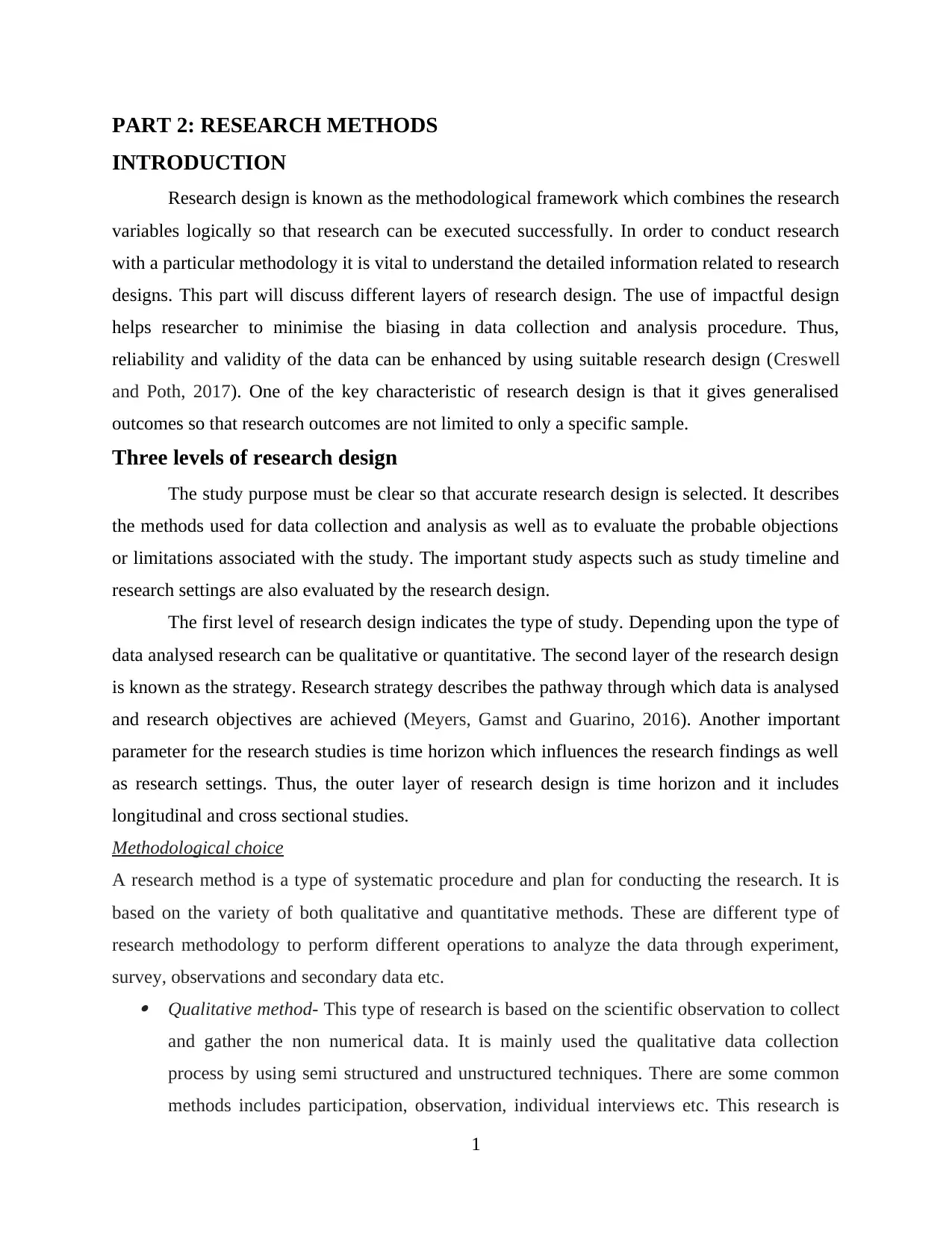
PART 2: RESEARCH METHODS
INTRODUCTION
Research design is known as the methodological framework which combines the research
variables logically so that research can be executed successfully. In order to conduct research
with a particular methodology it is vital to understand the detailed information related to research
designs. This part will discuss different layers of research design. The use of impactful design
helps researcher to minimise the biasing in data collection and analysis procedure. Thus,
reliability and validity of the data can be enhanced by using suitable research design (Creswell
and Poth, 2017). One of the key characteristic of research design is that it gives generalised
outcomes so that research outcomes are not limited to only a specific sample.
Three levels of research design
The study purpose must be clear so that accurate research design is selected. It describes
the methods used for data collection and analysis as well as to evaluate the probable objections
or limitations associated with the study. The important study aspects such as study timeline and
research settings are also evaluated by the research design.
The first level of research design indicates the type of study. Depending upon the type of
data analysed research can be qualitative or quantitative. The second layer of the research design
is known as the strategy. Research strategy describes the pathway through which data is analysed
and research objectives are achieved (Meyers, Gamst and Guarino, 2016). Another important
parameter for the research studies is time horizon which influences the research findings as well
as research settings. Thus, the outer layer of research design is time horizon and it includes
longitudinal and cross sectional studies.
Methodological choice
A research method is a type of systematic procedure and plan for conducting the research. It is
based on the variety of both qualitative and quantitative methods. These are different type of
research methodology to perform different operations to analyze the data through experiment,
survey, observations and secondary data etc. Qualitative method- This type of research is based on the scientific observation to collect
and gather the non numerical data. It is mainly used the qualitative data collection
process by using semi structured and unstructured techniques. There are some common
methods includes participation, observation, individual interviews etc. This research is
1
INTRODUCTION
Research design is known as the methodological framework which combines the research
variables logically so that research can be executed successfully. In order to conduct research
with a particular methodology it is vital to understand the detailed information related to research
designs. This part will discuss different layers of research design. The use of impactful design
helps researcher to minimise the biasing in data collection and analysis procedure. Thus,
reliability and validity of the data can be enhanced by using suitable research design (Creswell
and Poth, 2017). One of the key characteristic of research design is that it gives generalised
outcomes so that research outcomes are not limited to only a specific sample.
Three levels of research design
The study purpose must be clear so that accurate research design is selected. It describes
the methods used for data collection and analysis as well as to evaluate the probable objections
or limitations associated with the study. The important study aspects such as study timeline and
research settings are also evaluated by the research design.
The first level of research design indicates the type of study. Depending upon the type of
data analysed research can be qualitative or quantitative. The second layer of the research design
is known as the strategy. Research strategy describes the pathway through which data is analysed
and research objectives are achieved (Meyers, Gamst and Guarino, 2016). Another important
parameter for the research studies is time horizon which influences the research findings as well
as research settings. Thus, the outer layer of research design is time horizon and it includes
longitudinal and cross sectional studies.
Methodological choice
A research method is a type of systematic procedure and plan for conducting the research. It is
based on the variety of both qualitative and quantitative methods. These are different type of
research methodology to perform different operations to analyze the data through experiment,
survey, observations and secondary data etc. Qualitative method- This type of research is based on the scientific observation to collect
and gather the non numerical data. It is mainly used the qualitative data collection
process by using semi structured and unstructured techniques. There are some common
methods includes participation, observation, individual interviews etc. This research is
1
Paraphrase This Document
Need a fresh take? Get an instant paraphrase of this document with our AI Paraphraser
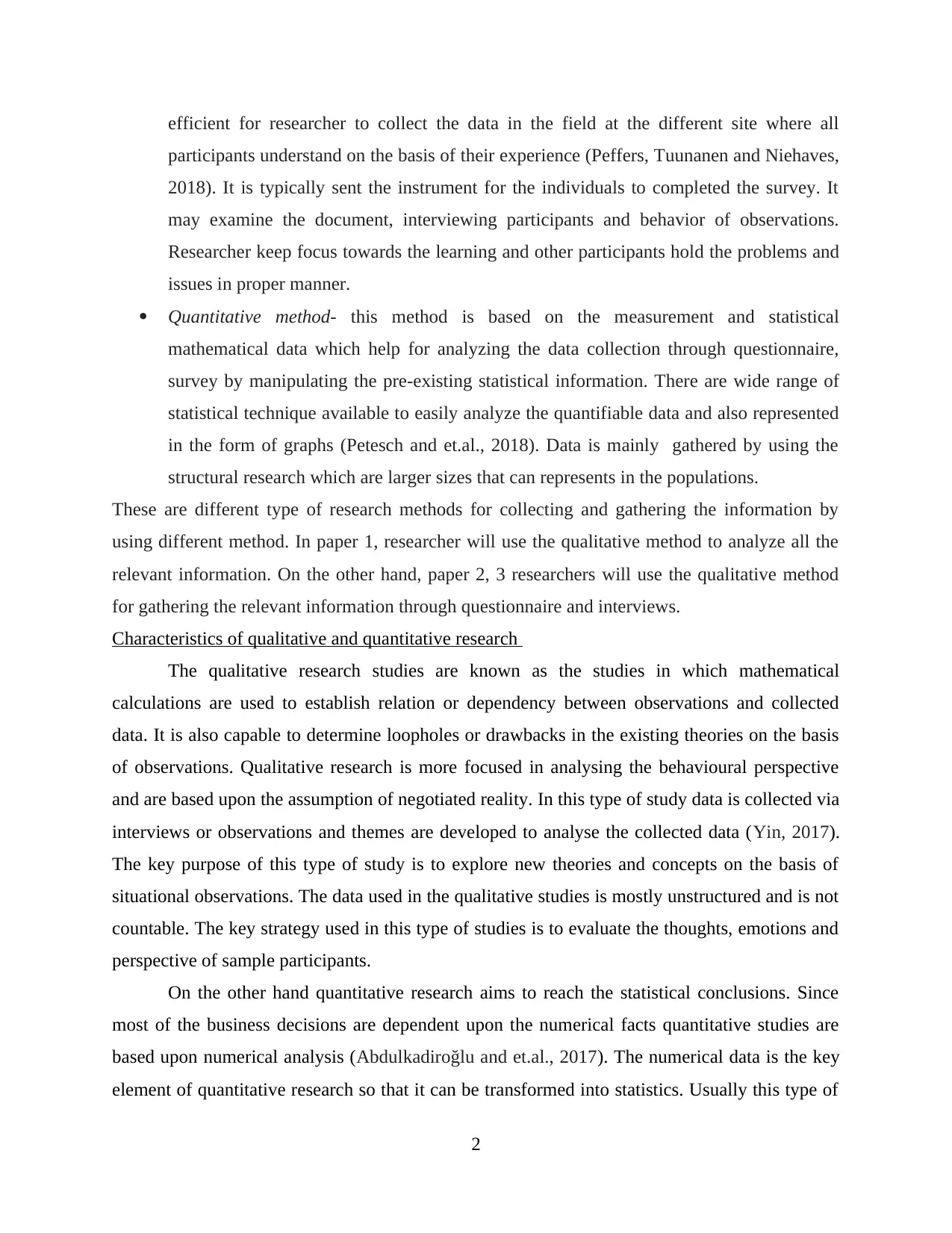
efficient for researcher to collect the data in the field at the different site where all
participants understand on the basis of their experience (Peffers, Tuunanen and Niehaves,
2018). It is typically sent the instrument for the individuals to completed the survey. It
may examine the document, interviewing participants and behavior of observations.
Researcher keep focus towards the learning and other participants hold the problems and
issues in proper manner.
Quantitative method- this method is based on the measurement and statistical
mathematical data which help for analyzing the data collection through questionnaire,
survey by manipulating the pre-existing statistical information. There are wide range of
statistical technique available to easily analyze the quantifiable data and also represented
in the form of graphs (Petesch and et.al., 2018). Data is mainly gathered by using the
structural research which are larger sizes that can represents in the populations.
These are different type of research methods for collecting and gathering the information by
using different method. In paper 1, researcher will use the qualitative method to analyze all the
relevant information. On the other hand, paper 2, 3 researchers will use the qualitative method
for gathering the relevant information through questionnaire and interviews.
Characteristics of qualitative and quantitative research
The qualitative research studies are known as the studies in which mathematical
calculations are used to establish relation or dependency between observations and collected
data. It is also capable to determine loopholes or drawbacks in the existing theories on the basis
of observations. Qualitative research is more focused in analysing the behavioural perspective
and are based upon the assumption of negotiated reality. In this type of study data is collected via
interviews or observations and themes are developed to analyse the collected data (Yin, 2017).
The key purpose of this type of study is to explore new theories and concepts on the basis of
situational observations. The data used in the qualitative studies is mostly unstructured and is not
countable. The key strategy used in this type of studies is to evaluate the thoughts, emotions and
perspective of sample participants.
On the other hand quantitative research aims to reach the statistical conclusions. Since
most of the business decisions are dependent upon the numerical facts quantitative studies are
based upon numerical analysis (Abdulkadiroğlu and et.al., 2017). The numerical data is the key
element of quantitative research so that it can be transformed into statistics. Usually this type of
2
participants understand on the basis of their experience (Peffers, Tuunanen and Niehaves,
2018). It is typically sent the instrument for the individuals to completed the survey. It
may examine the document, interviewing participants and behavior of observations.
Researcher keep focus towards the learning and other participants hold the problems and
issues in proper manner.
Quantitative method- this method is based on the measurement and statistical
mathematical data which help for analyzing the data collection through questionnaire,
survey by manipulating the pre-existing statistical information. There are wide range of
statistical technique available to easily analyze the quantifiable data and also represented
in the form of graphs (Petesch and et.al., 2018). Data is mainly gathered by using the
structural research which are larger sizes that can represents in the populations.
These are different type of research methods for collecting and gathering the information by
using different method. In paper 1, researcher will use the qualitative method to analyze all the
relevant information. On the other hand, paper 2, 3 researchers will use the qualitative method
for gathering the relevant information through questionnaire and interviews.
Characteristics of qualitative and quantitative research
The qualitative research studies are known as the studies in which mathematical
calculations are used to establish relation or dependency between observations and collected
data. It is also capable to determine loopholes or drawbacks in the existing theories on the basis
of observations. Qualitative research is more focused in analysing the behavioural perspective
and are based upon the assumption of negotiated reality. In this type of study data is collected via
interviews or observations and themes are developed to analyse the collected data (Yin, 2017).
The key purpose of this type of study is to explore new theories and concepts on the basis of
situational observations. The data used in the qualitative studies is mostly unstructured and is not
countable. The key strategy used in this type of studies is to evaluate the thoughts, emotions and
perspective of sample participants.
On the other hand quantitative research aims to reach the statistical conclusions. Since
most of the business decisions are dependent upon the numerical facts quantitative studies are
based upon numerical analysis (Abdulkadiroğlu and et.al., 2017). The numerical data is the key
element of quantitative research so that it can be transformed into statistics. Usually this type of
2
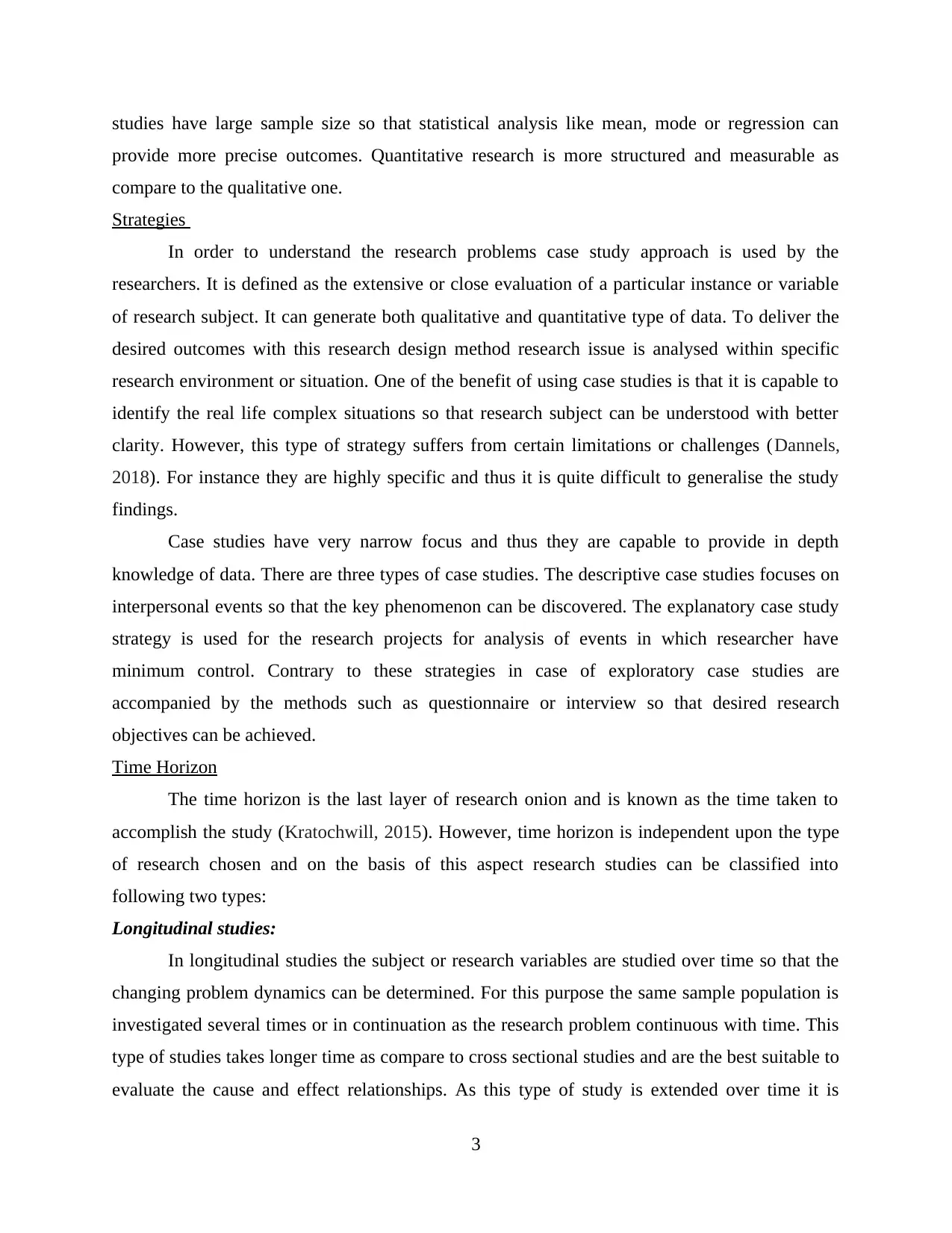
studies have large sample size so that statistical analysis like mean, mode or regression can
provide more precise outcomes. Quantitative research is more structured and measurable as
compare to the qualitative one.
Strategies
In order to understand the research problems case study approach is used by the
researchers. It is defined as the extensive or close evaluation of a particular instance or variable
of research subject. It can generate both qualitative and quantitative type of data. To deliver the
desired outcomes with this research design method research issue is analysed within specific
research environment or situation. One of the benefit of using case studies is that it is capable to
identify the real life complex situations so that research subject can be understood with better
clarity. However, this type of strategy suffers from certain limitations or challenges (Dannels,
2018). For instance they are highly specific and thus it is quite difficult to generalise the study
findings.
Case studies have very narrow focus and thus they are capable to provide in depth
knowledge of data. There are three types of case studies. The descriptive case studies focuses on
interpersonal events so that the key phenomenon can be discovered. The explanatory case study
strategy is used for the research projects for analysis of events in which researcher have
minimum control. Contrary to these strategies in case of exploratory case studies are
accompanied by the methods such as questionnaire or interview so that desired research
objectives can be achieved.
Time Horizon
The time horizon is the last layer of research onion and is known as the time taken to
accomplish the study (Kratochwill, 2015). However, time horizon is independent upon the type
of research chosen and on the basis of this aspect research studies can be classified into
following two types:
Longitudinal studies:
In longitudinal studies the subject or research variables are studied over time so that the
changing problem dynamics can be determined. For this purpose the same sample population is
investigated several times or in continuation as the research problem continuous with time. This
type of studies takes longer time as compare to cross sectional studies and are the best suitable to
evaluate the cause and effect relationships. As this type of study is extended over time it is
3
provide more precise outcomes. Quantitative research is more structured and measurable as
compare to the qualitative one.
Strategies
In order to understand the research problems case study approach is used by the
researchers. It is defined as the extensive or close evaluation of a particular instance or variable
of research subject. It can generate both qualitative and quantitative type of data. To deliver the
desired outcomes with this research design method research issue is analysed within specific
research environment or situation. One of the benefit of using case studies is that it is capable to
identify the real life complex situations so that research subject can be understood with better
clarity. However, this type of strategy suffers from certain limitations or challenges (Dannels,
2018). For instance they are highly specific and thus it is quite difficult to generalise the study
findings.
Case studies have very narrow focus and thus they are capable to provide in depth
knowledge of data. There are three types of case studies. The descriptive case studies focuses on
interpersonal events so that the key phenomenon can be discovered. The explanatory case study
strategy is used for the research projects for analysis of events in which researcher have
minimum control. Contrary to these strategies in case of exploratory case studies are
accompanied by the methods such as questionnaire or interview so that desired research
objectives can be achieved.
Time Horizon
The time horizon is the last layer of research onion and is known as the time taken to
accomplish the study (Kratochwill, 2015). However, time horizon is independent upon the type
of research chosen and on the basis of this aspect research studies can be classified into
following two types:
Longitudinal studies:
In longitudinal studies the subject or research variables are studied over time so that the
changing problem dynamics can be determined. For this purpose the same sample population is
investigated several times or in continuation as the research problem continuous with time. This
type of studies takes longer time as compare to cross sectional studies and are the best suitable to
evaluate the cause and effect relationships. As this type of study is extended over time it is
3
⊘ This is a preview!⊘
Do you want full access?
Subscribe today to unlock all pages.

Trusted by 1+ million students worldwide
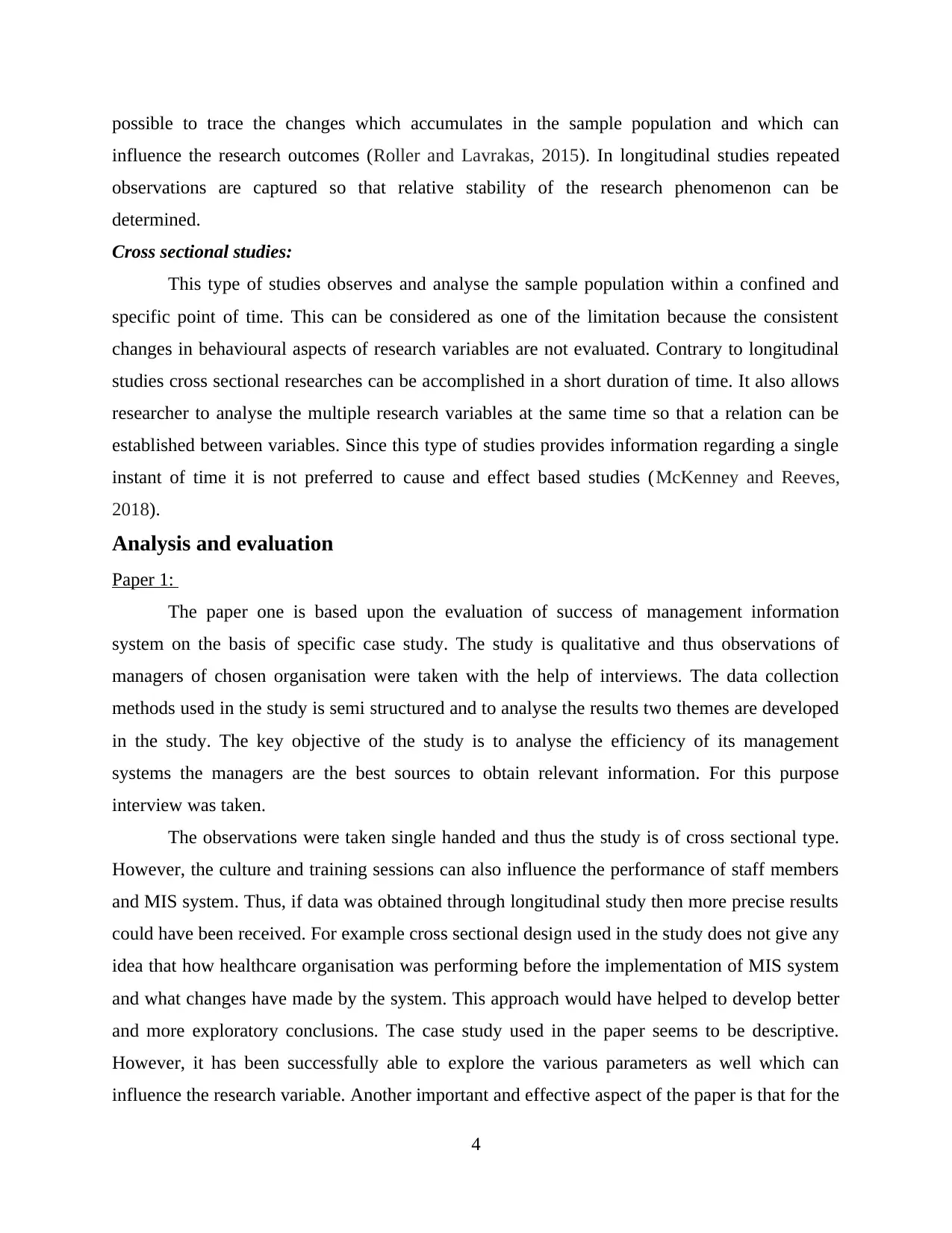
possible to trace the changes which accumulates in the sample population and which can
influence the research outcomes (Roller and Lavrakas, 2015). In longitudinal studies repeated
observations are captured so that relative stability of the research phenomenon can be
determined.
Cross sectional studies:
This type of studies observes and analyse the sample population within a confined and
specific point of time. This can be considered as one of the limitation because the consistent
changes in behavioural aspects of research variables are not evaluated. Contrary to longitudinal
studies cross sectional researches can be accomplished in a short duration of time. It also allows
researcher to analyse the multiple research variables at the same time so that a relation can be
established between variables. Since this type of studies provides information regarding a single
instant of time it is not preferred to cause and effect based studies (McKenney and Reeves,
2018).
Analysis and evaluation
Paper 1:
The paper one is based upon the evaluation of success of management information
system on the basis of specific case study. The study is qualitative and thus observations of
managers of chosen organisation were taken with the help of interviews. The data collection
methods used in the study is semi structured and to analyse the results two themes are developed
in the study. The key objective of the study is to analyse the efficiency of its management
systems the managers are the best sources to obtain relevant information. For this purpose
interview was taken.
The observations were taken single handed and thus the study is of cross sectional type.
However, the culture and training sessions can also influence the performance of staff members
and MIS system. Thus, if data was obtained through longitudinal study then more precise results
could have been received. For example cross sectional design used in the study does not give any
idea that how healthcare organisation was performing before the implementation of MIS system
and what changes have made by the system. This approach would have helped to develop better
and more exploratory conclusions. The case study used in the paper seems to be descriptive.
However, it has been successfully able to explore the various parameters as well which can
influence the research variable. Another important and effective aspect of the paper is that for the
4
influence the research outcomes (Roller and Lavrakas, 2015). In longitudinal studies repeated
observations are captured so that relative stability of the research phenomenon can be
determined.
Cross sectional studies:
This type of studies observes and analyse the sample population within a confined and
specific point of time. This can be considered as one of the limitation because the consistent
changes in behavioural aspects of research variables are not evaluated. Contrary to longitudinal
studies cross sectional researches can be accomplished in a short duration of time. It also allows
researcher to analyse the multiple research variables at the same time so that a relation can be
established between variables. Since this type of studies provides information regarding a single
instant of time it is not preferred to cause and effect based studies (McKenney and Reeves,
2018).
Analysis and evaluation
Paper 1:
The paper one is based upon the evaluation of success of management information
system on the basis of specific case study. The study is qualitative and thus observations of
managers of chosen organisation were taken with the help of interviews. The data collection
methods used in the study is semi structured and to analyse the results two themes are developed
in the study. The key objective of the study is to analyse the efficiency of its management
systems the managers are the best sources to obtain relevant information. For this purpose
interview was taken.
The observations were taken single handed and thus the study is of cross sectional type.
However, the culture and training sessions can also influence the performance of staff members
and MIS system. Thus, if data was obtained through longitudinal study then more precise results
could have been received. For example cross sectional design used in the study does not give any
idea that how healthcare organisation was performing before the implementation of MIS system
and what changes have made by the system. This approach would have helped to develop better
and more exploratory conclusions. The case study used in the paper seems to be descriptive.
However, it has been successfully able to explore the various parameters as well which can
influence the research variable. Another important and effective aspect of the paper is that for the
4
Paraphrase This Document
Need a fresh take? Get an instant paraphrase of this document with our AI Paraphraser
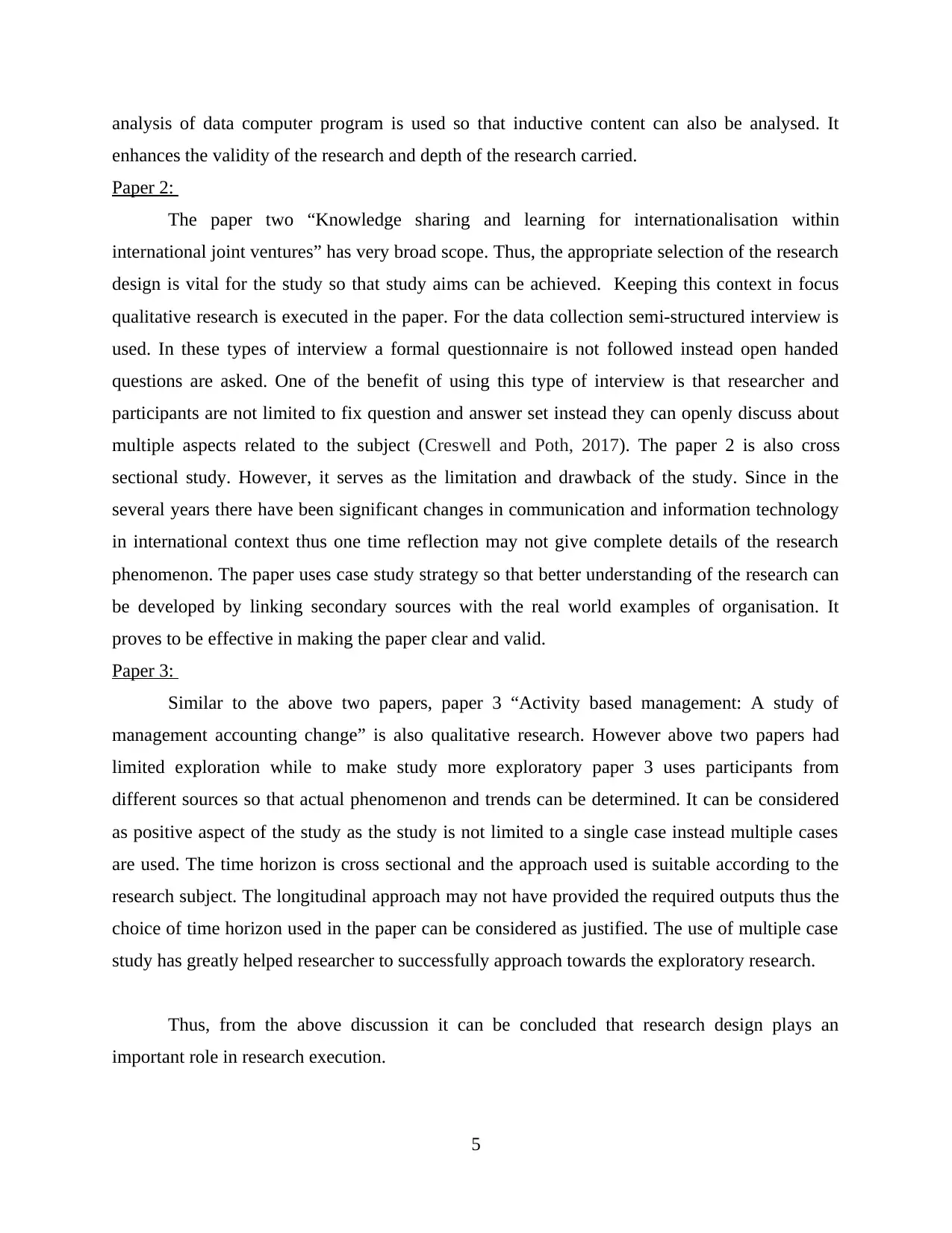
analysis of data computer program is used so that inductive content can also be analysed. It
enhances the validity of the research and depth of the research carried.
Paper 2:
The paper two “Knowledge sharing and learning for internationalisation within
international joint ventures” has very broad scope. Thus, the appropriate selection of the research
design is vital for the study so that study aims can be achieved. Keeping this context in focus
qualitative research is executed in the paper. For the data collection semi-structured interview is
used. In these types of interview a formal questionnaire is not followed instead open handed
questions are asked. One of the benefit of using this type of interview is that researcher and
participants are not limited to fix question and answer set instead they can openly discuss about
multiple aspects related to the subject (Creswell and Poth, 2017). The paper 2 is also cross
sectional study. However, it serves as the limitation and drawback of the study. Since in the
several years there have been significant changes in communication and information technology
in international context thus one time reflection may not give complete details of the research
phenomenon. The paper uses case study strategy so that better understanding of the research can
be developed by linking secondary sources with the real world examples of organisation. It
proves to be effective in making the paper clear and valid.
Paper 3:
Similar to the above two papers, paper 3 “Activity based management: A study of
management accounting change” is also qualitative research. However above two papers had
limited exploration while to make study more exploratory paper 3 uses participants from
different sources so that actual phenomenon and trends can be determined. It can be considered
as positive aspect of the study as the study is not limited to a single case instead multiple cases
are used. The time horizon is cross sectional and the approach used is suitable according to the
research subject. The longitudinal approach may not have provided the required outputs thus the
choice of time horizon used in the paper can be considered as justified. The use of multiple case
study has greatly helped researcher to successfully approach towards the exploratory research.
Thus, from the above discussion it can be concluded that research design plays an
important role in research execution.
5
enhances the validity of the research and depth of the research carried.
Paper 2:
The paper two “Knowledge sharing and learning for internationalisation within
international joint ventures” has very broad scope. Thus, the appropriate selection of the research
design is vital for the study so that study aims can be achieved. Keeping this context in focus
qualitative research is executed in the paper. For the data collection semi-structured interview is
used. In these types of interview a formal questionnaire is not followed instead open handed
questions are asked. One of the benefit of using this type of interview is that researcher and
participants are not limited to fix question and answer set instead they can openly discuss about
multiple aspects related to the subject (Creswell and Poth, 2017). The paper 2 is also cross
sectional study. However, it serves as the limitation and drawback of the study. Since in the
several years there have been significant changes in communication and information technology
in international context thus one time reflection may not give complete details of the research
phenomenon. The paper uses case study strategy so that better understanding of the research can
be developed by linking secondary sources with the real world examples of organisation. It
proves to be effective in making the paper clear and valid.
Paper 3:
Similar to the above two papers, paper 3 “Activity based management: A study of
management accounting change” is also qualitative research. However above two papers had
limited exploration while to make study more exploratory paper 3 uses participants from
different sources so that actual phenomenon and trends can be determined. It can be considered
as positive aspect of the study as the study is not limited to a single case instead multiple cases
are used. The time horizon is cross sectional and the approach used is suitable according to the
research subject. The longitudinal approach may not have provided the required outputs thus the
choice of time horizon used in the paper can be considered as justified. The use of multiple case
study has greatly helped researcher to successfully approach towards the exploratory research.
Thus, from the above discussion it can be concluded that research design plays an
important role in research execution.
5
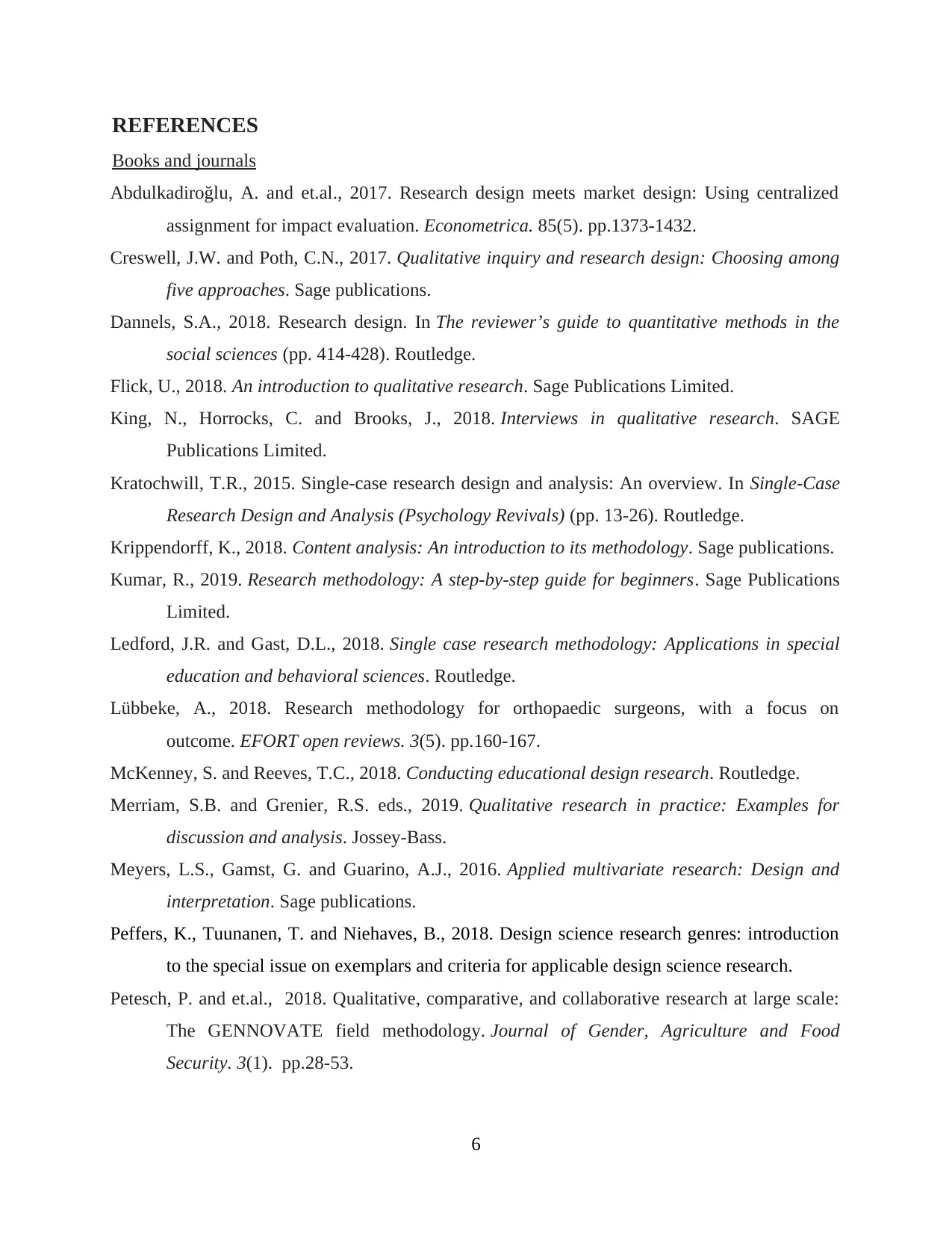
REFERENCES
Books and journals
Abdulkadiroğlu, A. and et.al., 2017. Research design meets market design: Using centralized
assignment for impact evaluation. Econometrica. 85(5). pp.1373-1432.
Creswell, J.W. and Poth, C.N., 2017. Qualitative inquiry and research design: Choosing among
five approaches. Sage publications.
Dannels, S.A., 2018. Research design. In The reviewer’s guide to quantitative methods in the
social sciences (pp. 414-428). Routledge.
Flick, U., 2018. An introduction to qualitative research. Sage Publications Limited.
King, N., Horrocks, C. and Brooks, J., 2018. Interviews in qualitative research. SAGE
Publications Limited.
Kratochwill, T.R., 2015. Single-case research design and analysis: An overview. In Single-Case
Research Design and Analysis (Psychology Revivals) (pp. 13-26). Routledge.
Krippendorff, K., 2018. Content analysis: An introduction to its methodology. Sage publications.
Kumar, R., 2019. Research methodology: A step-by-step guide for beginners. Sage Publications
Limited.
Ledford, J.R. and Gast, D.L., 2018. Single case research methodology: Applications in special
education and behavioral sciences. Routledge.
Lübbeke, A., 2018. Research methodology for orthopaedic surgeons, with a focus on
outcome. EFORT open reviews. 3(5). pp.160-167.
McKenney, S. and Reeves, T.C., 2018. Conducting educational design research. Routledge.
Merriam, S.B. and Grenier, R.S. eds., 2019. Qualitative research in practice: Examples for
discussion and analysis. Jossey-Bass.
Meyers, L.S., Gamst, G. and Guarino, A.J., 2016. Applied multivariate research: Design and
interpretation. Sage publications.
Peffers, K., Tuunanen, T. and Niehaves, B., 2018. Design science research genres: introduction
to the special issue on exemplars and criteria for applicable design science research.
Petesch, P. and et.al., 2018. Qualitative, comparative, and collaborative research at large scale:
The GENNOVATE field methodology. Journal of Gender, Agriculture and Food
Security. 3(1). pp.28-53.
6
Books and journals
Abdulkadiroğlu, A. and et.al., 2017. Research design meets market design: Using centralized
assignment for impact evaluation. Econometrica. 85(5). pp.1373-1432.
Creswell, J.W. and Poth, C.N., 2017. Qualitative inquiry and research design: Choosing among
five approaches. Sage publications.
Dannels, S.A., 2018. Research design. In The reviewer’s guide to quantitative methods in the
social sciences (pp. 414-428). Routledge.
Flick, U., 2018. An introduction to qualitative research. Sage Publications Limited.
King, N., Horrocks, C. and Brooks, J., 2018. Interviews in qualitative research. SAGE
Publications Limited.
Kratochwill, T.R., 2015. Single-case research design and analysis: An overview. In Single-Case
Research Design and Analysis (Psychology Revivals) (pp. 13-26). Routledge.
Krippendorff, K., 2018. Content analysis: An introduction to its methodology. Sage publications.
Kumar, R., 2019. Research methodology: A step-by-step guide for beginners. Sage Publications
Limited.
Ledford, J.R. and Gast, D.L., 2018. Single case research methodology: Applications in special
education and behavioral sciences. Routledge.
Lübbeke, A., 2018. Research methodology for orthopaedic surgeons, with a focus on
outcome. EFORT open reviews. 3(5). pp.160-167.
McKenney, S. and Reeves, T.C., 2018. Conducting educational design research. Routledge.
Merriam, S.B. and Grenier, R.S. eds., 2019. Qualitative research in practice: Examples for
discussion and analysis. Jossey-Bass.
Meyers, L.S., Gamst, G. and Guarino, A.J., 2016. Applied multivariate research: Design and
interpretation. Sage publications.
Peffers, K., Tuunanen, T. and Niehaves, B., 2018. Design science research genres: introduction
to the special issue on exemplars and criteria for applicable design science research.
Petesch, P. and et.al., 2018. Qualitative, comparative, and collaborative research at large scale:
The GENNOVATE field methodology. Journal of Gender, Agriculture and Food
Security. 3(1). pp.28-53.
6
⊘ This is a preview!⊘
Do you want full access?
Subscribe today to unlock all pages.

Trusted by 1+ million students worldwide
1 out of 13
Related Documents
Your All-in-One AI-Powered Toolkit for Academic Success.
+13062052269
info@desklib.com
Available 24*7 on WhatsApp / Email
![[object Object]](/_next/static/media/star-bottom.7253800d.svg)
Unlock your academic potential
Copyright © 2020–2026 A2Z Services. All Rights Reserved. Developed and managed by ZUCOL.





